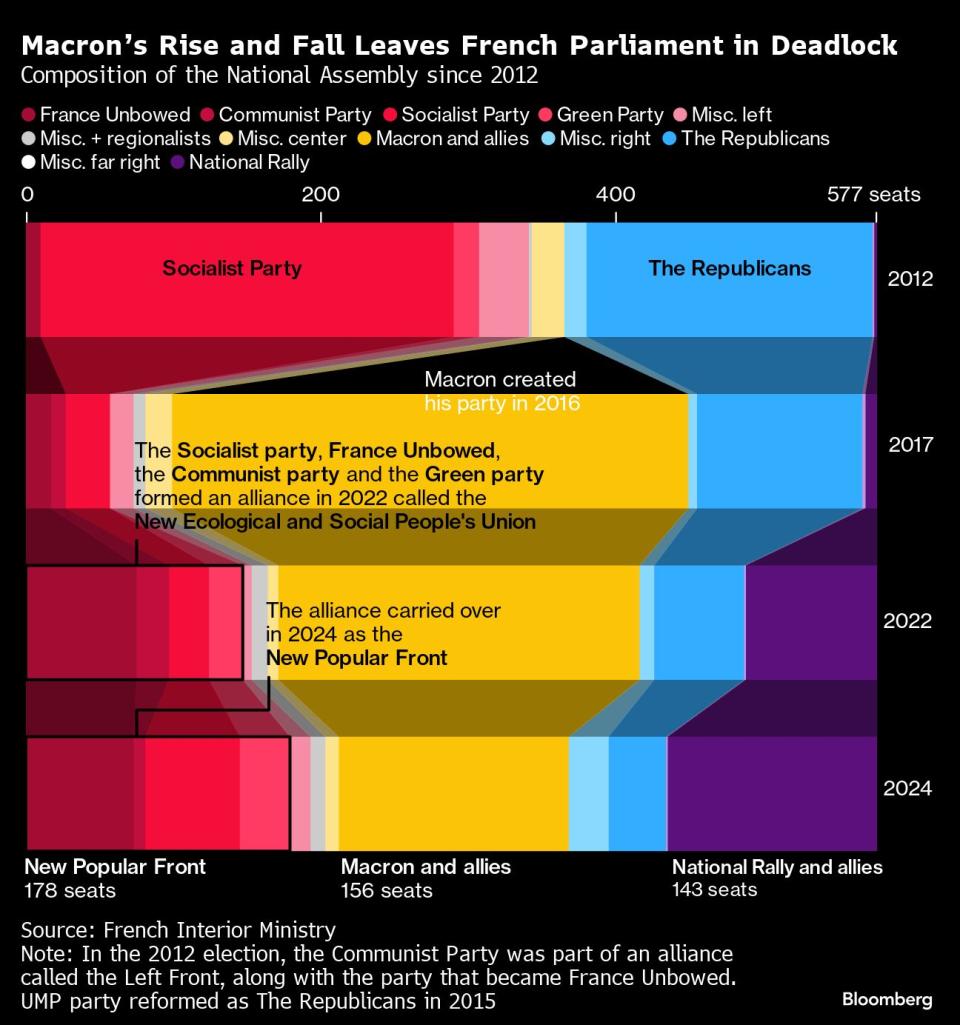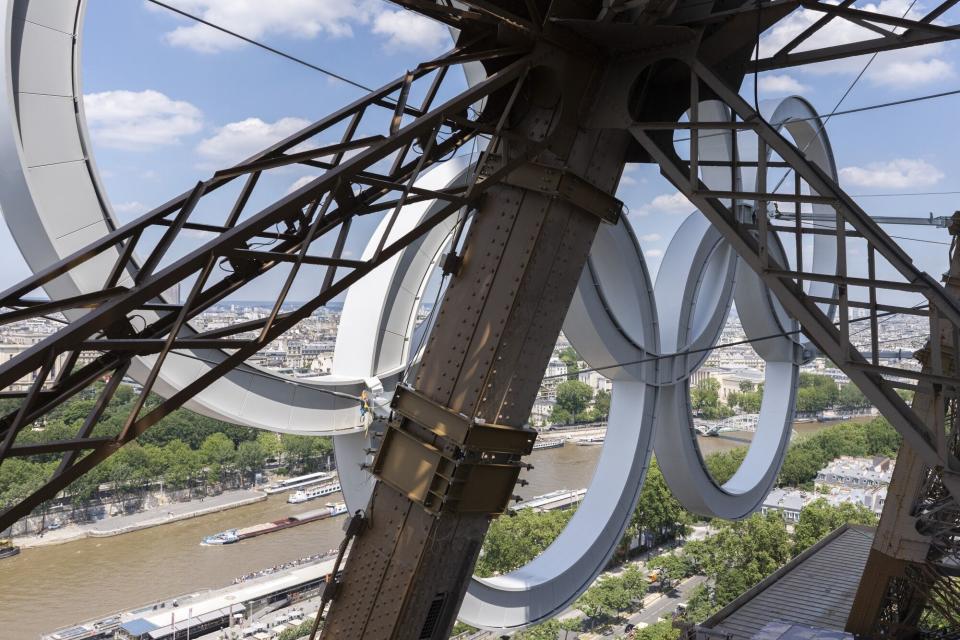France Seeks a Premier Who Can Survive in the Job: What to Watch
(Bloomberg) -- France’s snap legislative election has caused an unusually perplexing situation for a country more used to having a president whose government commands a majority in parliament to pass laws.
Most Read from Bloomberg
Tesla Delays Robotaxi Event in Blow to Musk’s Autonomy Drive
Stock Rotation Hits Megacaps on Bets Fed Will Cut: Markets Wrap
Saudis Warned G-7 Over Russia Seizures With Debt Sale Threat
Saudi Prince’s Trillion-Dollar Makeover Faces Funding Cutbacks
The fading popularity of Emmanuel Macron, coupled with rising support for the far-right National Rally of Marine Le Pen and the left’s largely successful efforts to band together to stop her, have delivered a lower house that’s split three ways, with no obvious alliance that can govern.
The most pressing question for Macron now is how to pick the next prime minister able to form a functioning French government.
What’s the Current State of Play?
In Paris, which is about to host the summer Olympics, several candidates have thrown their hat into the ring with contradictory arguments for why they would be best placed to get the urgent business of government done.
The usually loquacious Macron has remained largely silent as parties fight it out, choosing only to publish a letter in a group of regional newspapers in which he called on parties that represent “republican forces” to build a broad majority from the political center — to the exclusion of Le Pen and the far-left France Unbowed of Jean-Luc Melenchon.
Prior to Macron, who took the presidency in 2017 by rallying the center, ripping up the established order in the process, power had tended to swing to the left or to the right. The president then lost his absolute majority five years later, yet his group remained the biggest by far, and there were enough lawmakers from the conservative Republicans to keep the administration in place and get at least some legislation over the line.
This time, he was beaten into second place by the New Popular Front, which seeks to reconcile views ranging from the Socialists and Greens to the Communists and Melenchon’s France Unbowed. This hastily cobbled-together alliance succeeded in keeping Le Pen out of power but will have fewer than 200 of the 577 seats in the National Assembly, short of the 289 needed for an absolute majority. The National Rally is the biggest single party, with 125 lawmakers.
As a result of the inconclusive division of forces, potential premiers have emerged from the parties that make up the leftist coalition, and from the center and center-right.
How Is the Prime Minister Selected?
Under the constitution of the Fifth Republic, forged by Charles de Gaulle in 1958, it’s the prerogative of the president to appoint a prime minister. As a counterweight, the National Assembly has the power to bring down the government if a majority of lawmakers choose to back a motion of no-confidence.
On three occasions, a president has had to “cohabit” with an opposing party in government after defeat in legislative elections. It has been accepted practice to nominate a premier from the winning party, though in each case they had clear majorities.
As the biggest group, the New Popular Front says the prime minister should come from its ranks and has pledged to put forward a name in the coming days. The Republicans object.
Macron will need to pick someone who attracts sufficient consensus to survive beyond day one in the job. This has prompted some centrists and center-right politicians to suggest candidates who could hold together a broad coalition that also includes moderate left-wing lawmakers in order to pass a modest number of bills.
For now, Macron has asked Gabriel Attal to remain in post at the head of government to maintain stability.
When Does Parliament Business Resume?
The new National Assembly will sit for the first time at 3 p.m. on Thursday, July 18. The 577 lawmakers will have to elect a president for the chamber via a secret ballot. If no candidate gets an absolute majority of the votes expressed over two rounds, a third first-past-the-post round will decide the contest.
The make-up of the political groups will also be finalized, and members will be assigned to the eight permanent parliamentary committees and chairs elected. Six vice-presidents, three administrators and 12 secretaries must also be appointed.
The 17 ministers in the outgoing administration who have won seats in the election would need to resign by July 18 if they want to be able to take up any of these roles or become head of a political group within the new assembly, or indeed take part in the votes.
The assembly president, vice-presidents and group leaders will meet for the first time on July 20 to set the agenda for the parliamentary session, which will run until Aug. 2.
What About the Budget?
The new administration will have to submit its medium-term fiscal plan to the European Commission by Sept. 20 to show how it intends to balance its public accounts.
These plans are discussed with the commission, the European Union’s executive arm, and ratified by the EU Council, which brings together the member states, to serve as the basis for the annual budget that must be submitted by mid-October.
Current Finance Minister Bruno Le Maire, who wasn’t a candidate in the election, said he has sent 2024 spending limits to ministries and instigated technical work on next year’s budget.
And if It All Fails?
Macron is unable to dissolve parliament again for a period of 12 months. He could, however, step down, prompting fresh elections. In that case, the head of the Senate — a post held for the last decade by Republicans lawmaker Gerard Larcher — becomes interim president until a new one is elected.
--With assistance from Marie Patino and Tom Fevrier.
Most Read from Bloomberg Businessweek
Ukraine Is Fighting Russia With Toy Drones and Duct-Taped Bombs
At SpaceX, Elon Musk’s Own Brand of Cancel Culture Is Thriving
He’s Starting an Olympics Rival Where the Athletes Are on Steroids
©2024 Bloomberg L.P.

 Yahoo News
Yahoo News 


